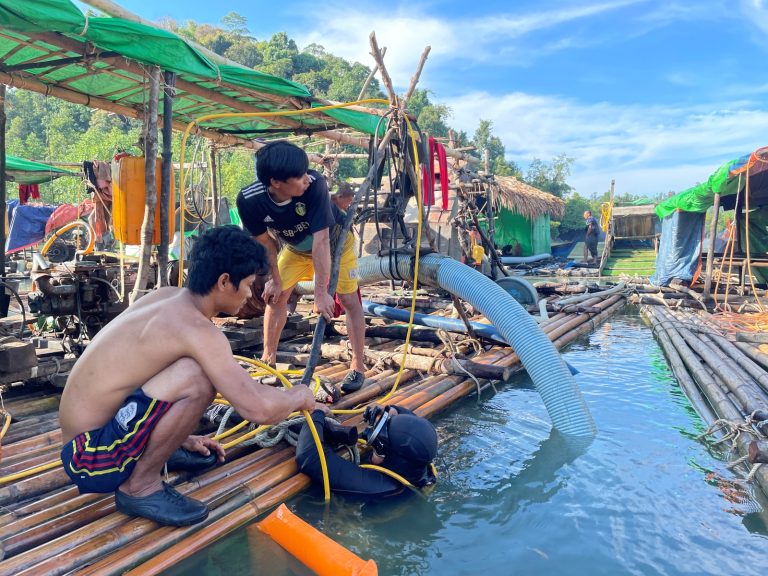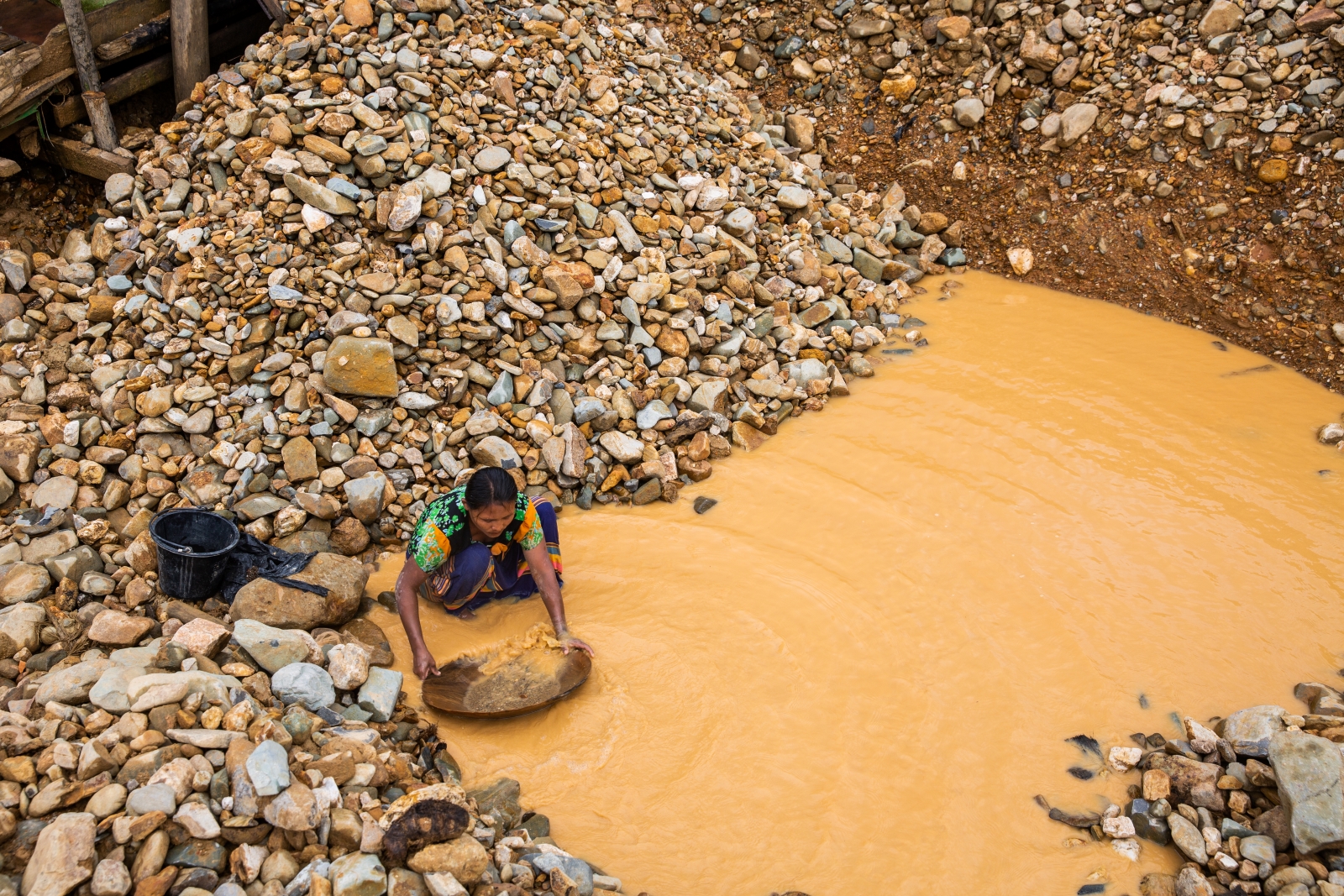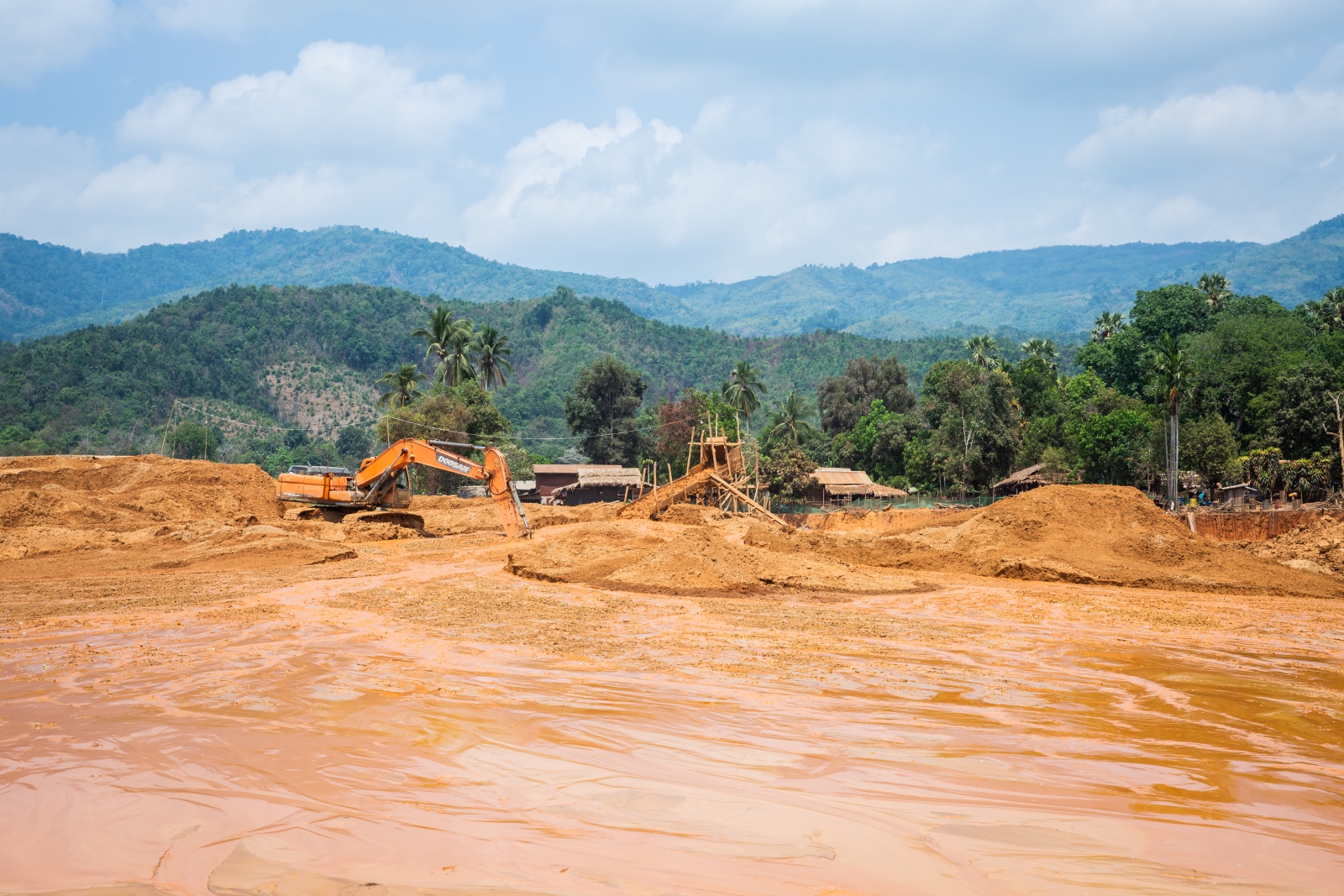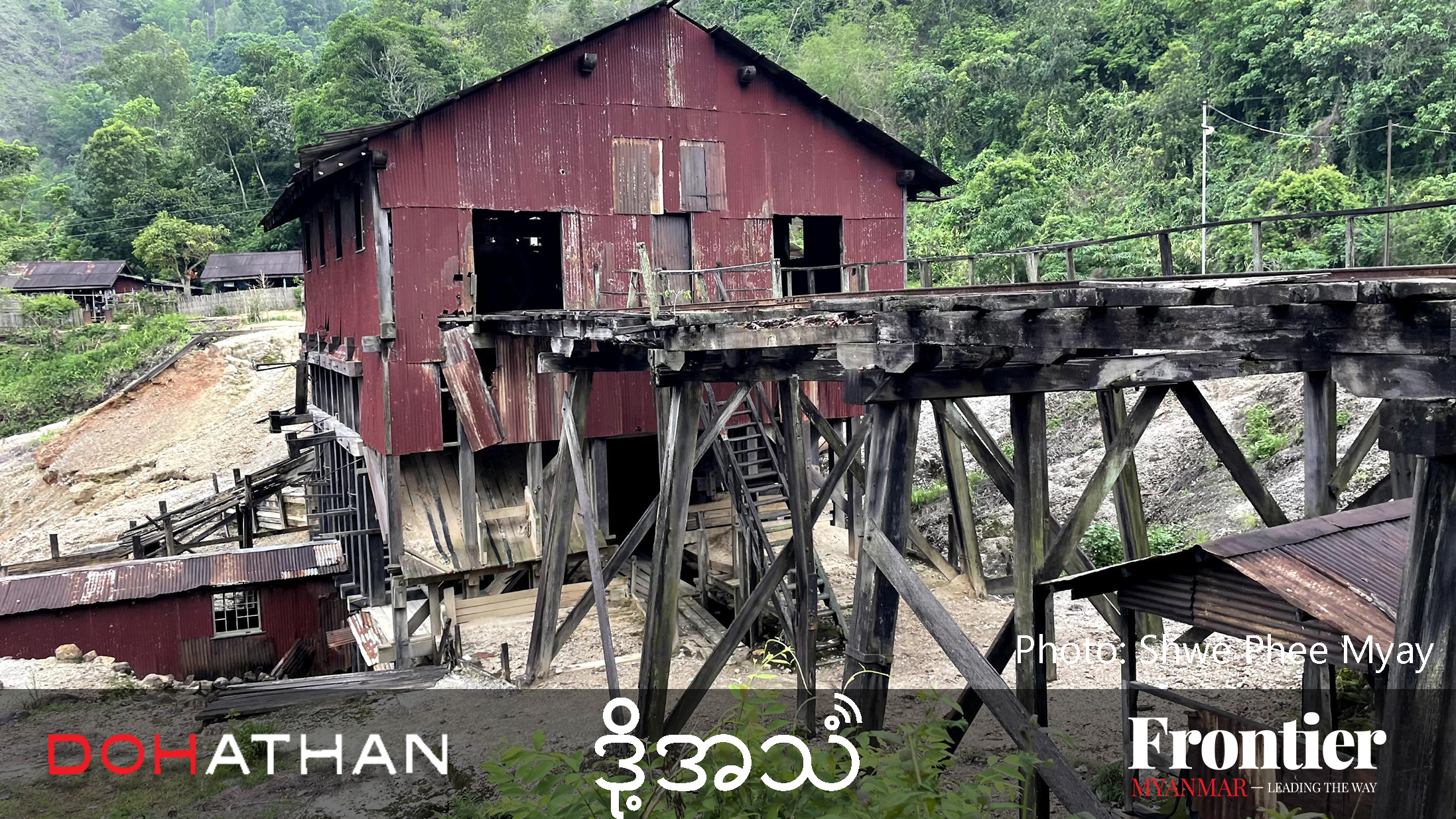To the surprise of many, U Thein Sein’s administration announced plans to join the Extractive Industries Transparency Initiative in 2012, but progress toward compliance has largely stalled under the NLD-backed government.
By THOMAS KEAN | FRONTIER
THE MYANMAR Extractive Industries Transparency Initiative website stands as a silent testament to the U Thein Sein era, the last update under its “latest news” section posted at 11am on March 10, 2016.
Thein Sein surprised many when he announced in 2012 that his government would seek EITI candidacy. The EITI process is designed to reveal how much revenue the government earns from extractive sectors and from which companies – both sensitive questions in a country renowned for corruption and the mismanagement of its extensive natural resources.
A multi-stakeholder group (MSG) comprising government, civil society and private sector officials was formed and oversaw the drafting of the first EITI report, which was submitted in early 2016. While this report was far from perfect – the jade sector was barely addressed, for example, and some data was inaccurate – it was still widely welcomed as a step forward for the transparent management of natural resources.
But then Myanmar’s transition got in the way, bringing the country’s progress toward EITI compliancy to a halt.
Support more independent journalism like this. Sign up to be a Frontier member.
The multi-stakeholder group, which was disbanded with the change of government, has still not been re-formed. This is a major problem – if Myanmar fails to submit its second report by the end of March, the EITI Board will have no choice but to suspend it.
To say it would be a bad look is an understatement; civil society MSG member Ma Moe Moe Tun told Frontier that suspension would be “shameful”, particularly given the National League for Democracy’s commitment to transparency and accountability.
“The U Thein Sein government successfully completed the first report, so why can’t the people’s elected government follow up with the second report?” said Moe Moe Tun, who is also joint secretary of the Sein Lan Pyin Oo Lwin environmental group.
Last-minute rush
The prospect of suspension seems to have spurred the government into action. In December, a “preparatory meeting” was conducted with some members of the old MSG in order to meet a more pressing deadline – the submission of a draft roadmap on beneficial ownership by December 31. The draft roadmap was submitted as required, but civil society participants said the lack of time and effort that went into the document compromised its quality.
On December 19, the government also appointed a “leading authority” – a high-level committee to oversee the process – headed by a “champion” – Minister for Finance and Planning U Kyaw Win – to spearhead implementation.
But observers agree that it would be impossible for the second report to be completed by March. That means the next important deadline is at the end of this month, when Myanmar has to apply for an extension for its second report. This will first require the government to re-form the MSG, as the application must come from this group.

Women collect copper near Lashio, Shan State. The government has issued an estimated 10,000 mining concessions and most are recorded only on paper, making it difficult and time-consuming to share and reconcile data from the sector. (AFP)
There is no guarantee that such an application will be approved. Countries seeking an extension are required to show evidence of “continuous progress” toward meeting the deadline, and that the delay was due to “exceptional circumstances”.
The EITI Board seems open to an extension, though; several sources told Frontier that the Board wanted to avoid suspending Myanmar if possible.
EITI policy director Ms Dyveke Rogan told Frontier by email that it was “not uncommon” for implementation to slow down after a change in government.
Despite the delays, she said progress had been made in recent months, including the publication of the annual progress report and development of the draft beneficial ownership roadmap.
“We are excited to work with the newly appointed team and hope that the new MSG will soon be inaugurated,” she added.
There’s a question though of whether a six-month extension would be enough, even if work got underway immediately. The selection of an independent administrator by the MSG to produce the report could take three or four months alone, as it must be put out to tender.
That will leave a small window for other tasks, such as drafting the scoping study, negotiating with stakeholders, and compiling and reconciling the data.
“We think six months is not enough,” said Moe Moe Tun. “How are you going to consolidate the report in two months?”
Ko Min Zar Ni Lin, a a senior technical and policy analyst at the Centre for Economic and Social Development, which coordinated the EITI process under the Thein Sein administration, said the extension was necessary but may further complicate the second report.
Under the EITI Standard, data used in the report should not be more than two years old. However, Myanmar’s first report covered the 2013-14 fiscal year and reporting cannot skip a year.
“They may need to cover two fiscal years in the second report,” said Min Zar Ni Lin, who worked on the EITI process since it was launched by Thein Sein.
“I’m a little concerned about whether the government can produce two fiscal years of data in [six months]. It is possible, but the political will is also important and all government agencies need to work collectively to produce the data in time.”
At the same time, the MSG needs to – at least in theory – expand and improve on the first report. Myanmar will be assessed for compliancy against the EITI Standard in 2018 largely on the basis of its annual reports.
The first of these contained a number of recommendations, ranging from treating military holding companies as state-owned enterprises for reporting purposes to creating an online register of licenses. There’s an understanding that it has to begin acting on at least some of those to get the EITI seal of approval.
“To get this report finished within a six-month extension the government will need to move very fast,” said Dr Marjanneke Vijge, a researcher and visiting scholar at CESD who has studied EITI for the past six months. “And to go beyond the first report, of course, because that’s the whole idea; the second report needs to address the recommendations from the first report.”
What’s the problem?
For many observers, the delay has been puzzling – particularly given the potential consequences.
There is a consensus that the government, which has been heavily focused on the peace process and distracted by events in Rakhine State, neglected EITI because it did not consider it an immediate priority.
There also appears to be a bottleneck at the top of the government; sources told Frontier the proposal to form the leading authority had waited at least three months for cabinet approval.
Another source suggested that senior government officials were not well acquainted with the initiative and simply did not realise the ramifications of missing the deadline to submit the second report.
There is also the perception that the EITI was Thein Sein’s pet project, nurtured to enhance the credibility of his government. The thinking goes that this makes it less appealing to Daw Aung San Suu Kyi’s administration, which has little need for further domestic or international legitimacy.
Moe Moe Tun, the civil society MSG member, suggested that the military, private sector and bureaucrats within the government were also resistant to making further progress on EITI because it would potentially hurt their interests.
Of particular concern to civil servants, she said, were plans to address beneficial ownership and ministries’ use of “other” accounts.
“[Senior civil servants] get a lot of benefits from the private sector so they want to cover it up,” Moe Moe Tun said.
Beneficial ownership would reveal any politically exposed persons – government officials and their close personal or professional associates – who are involved in the extractive sector.
The “other accounts” were identified in the first EITI report. Only 45 percent of revenues generated by state-owned enterprises go into the national budget; the rest is held in an “other account” at a state bank. Details of these accounts were not provided to the MSG, which made it impossible to assess in the first report whether Myanmar was compliant with the EITI Standard.
The report recommended that the government consider counting all revenues from extractives as normal budgetary revenue, and also improving disclosure about the use of “other accounts”.

Construction vehicles at a jade mine in Hpakant. Just a fraction of Myanmar’s lucrative jade sector – which some say could be worth up to US$30 billion a year – was covered in the first Extractive Industries Transparency Initiative report. (AFP)
Another major issue that was unaddressed in the first report was jade sales outside the state-organised gem emporium. Official revenues from the sector are thought to be just a fraction of income from illegal exports; Global Witness has estimated that the illicit trade was worth in excess of US$30 billion in 2014.
Min Zar Ni Lin said the government would face both political and technical challenges if it sought to expand coverage of the mining sector. The oil and gas sector covered a few dozen licences and just four operators; in contrast, there are an estimated 10,000 mining licences and 600 operators.
“Informal activities are a disaster,” he said. “If you visit to the jade mining area, like Hpakant and Lonekhin [in Kachin State], there are lots of informal activities going on. … We still don’t really know what the sector looks like outside the emporium.”
EITI ‘part of the answer’
Ministry of Planning and Finance officials could not be reached or did not respond to requests for comment.
But Dr Sean Turnell, an economist from Australia’s Macquarie University and economic adviser to the NLD, told Frontier that EITI was “of great import” to the government.
The government plans not only to entrench the process through the continuation of existing reporting procedures but also expand it through the inclusion of the jade sector and beneficial ownership provisions, he said.
The Renaissance Institute, an NLD-linked think-tank, will take over the coordination role from the CESD, which is part of the Myanmar Development Resource Institute.
“Overall there is much recognition that EITI is part of the answer to bringing home the significant revenues that have been lost to the government from the extractive sector, and to some extent a metric against which these endeavours can be measured,” Turnell said.
He attributed the delays to the Thein Sein government’s failure to share economic information prior to the handover and the lack of human resources available to the government.
“The small range of people able to take EITI up were more or less the same people able to take up other things too,” he said.
The government has been given plenty of time to get moving, though. Civil society organisations and international stakeholders, such as the EITI Secretariat and World Bank, are yet to publicly speak out about the government dragging its feet. There’s a level of understanding that EITI is not necessarily at the top of the government’s long list of priorities.
Moe Moe Tun said the silence was partly because civil society groups working on EITI had adopted a different approach toward the NLD government than its predecessor.
“Under the last government, we were very confrontational and attacked them a lot,” she said. “But this government is a publicly elected government so we are thinking about changing our strategy, how to approach them to make it happen. We are now still thinking about not making a confrontation because if we do they might drop EITI completely.”
An ‘iterative process’
Why does EITI even matter? Some have argued that its focus is so narrow – a mechanism to track revenues from natural resources from the private sector to government accounts – that the benefits are limited.
Although touted as a corruption-fighting tool, it only deals in reported payments so cannot uncover revenues that never make it on to the books. EITI doesn’t address directly the big issues of resource governance, which are so central to Myanmar’s peace process.
Civil society organisations also have many complaints about the drafting process of the first report. Moe Moe Tun said the only section that they were satisfied with was the recommendations. Tensions ran so high that on several occasions the civil society members on the MSG threatened to pull out of the process.
“In the last report meeting, we fought a lot of with the government and secretariat and private sector,” she said.
Moe Moe Tun questioned whether the Thein Sein government really understood what was required of it when it signed up for EITI membership. She noted that when the process first got going, the government tried to involve government-controlled NGOs, or those with little activist bent.
Groups focused on natural resource governance responded by forming an umbrella organisation, the Myanmar Alliance for Transparency and Accountability, that became the main representative body for CSO involvement.
“The Thein Sein government made [EITI] just for show,” Moe Moe Tun said.
But in a country ranked near the bottom of every business-related index, a little bit of progress can mean a lot.
Dr Adam Simpson, director of the Centre for Peace and Security at the University of South Australia, said a major success of the EITI process was that it brought together the government, private sector and civil society on equal footing to discuss an issue critical to the country’s future development.
Although there was limited real acceptance from the government of civil society as an equal partner, CSOs still managed to broaden the scope and agenda of EITI in Myanmar, he said.
“Given Myanmar governments’ historical lack of consultation with civil society, the EITI and its international oversight played a crucial role in establishing civil society as a legitimate actor within natural resource governance in the country,” said Simpson, who recently completed a book chapter on EITI in Myanmar.
While the first report was far from perfect, it offered a foundation on which to build and would complement other reforms to the governance of extractive industries.
“In a sense the EITI is an iterative process. Myanmar’s first EITI report was full of omissions and inaccuracies but by documenting and highlighting these errors subsequent reports should improve the accuracy of reporting,” he said.
Simpson said the government should also not overlook the role EITI could play in addressing its political agenda.
“Economic concerns, and natural resource governance in particular, are intimately interwoven with issues of ethnic and civil conflict in Myanmar,” he said. “Improved natural resource governance, through greater transparency, effective environmental assessment and resource redistribution, is likely to facilitate the peace process rather than flow from it.”
Moe Moe Tun said she was confident the government would proceed with EITI and improve on the report produced under the Thein Sein government.
“We believe that they want to do it and they have to do it. They don’t want to hurt their image,” she said. “This government has to make [the process] more standardised and create a better quality report.”
Top photo: AFP







